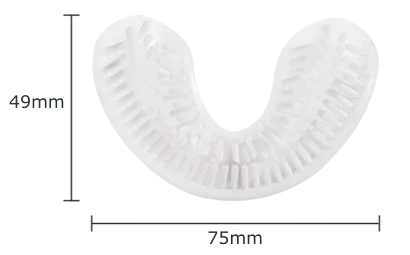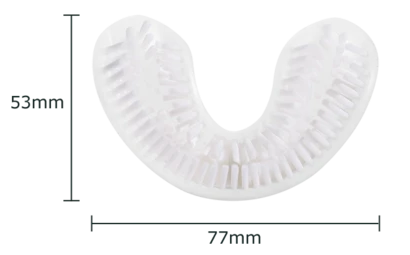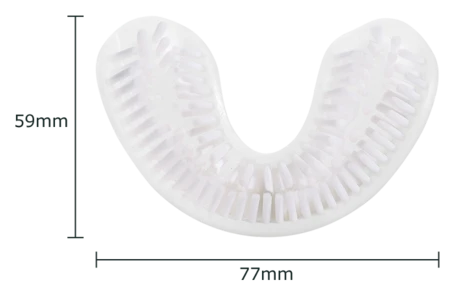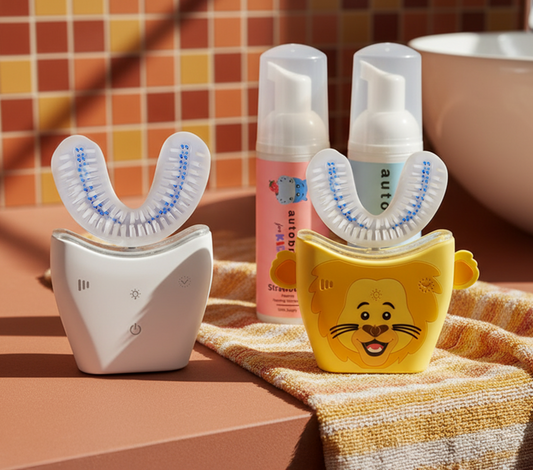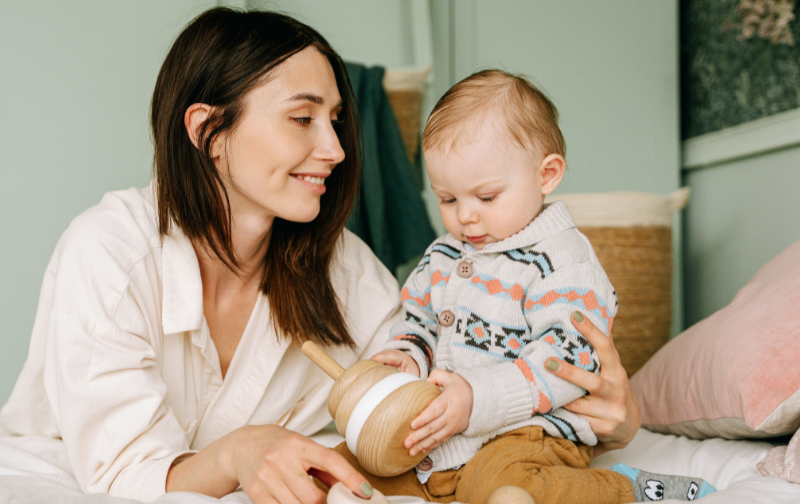
Brushing Baby’s Teeth: Everything You Need to Know
The Importance of Baby Teeth
During the first 18+ months of your baby’s life, there are so many milestones that we look forward to as parents. Your baby’s first laugh, crawl, words, steps, and even their first tooth!
While teething doesn’t usually make the highlight reel of your baby’s first year, their first teeth, also referred to as milk teeth, are actually crucial to their overall development. Their first set of teeth acts as placeholders for their adult teeth.
Without healthy milk teeth, your baby may struggle with…
- Speech development
- Crooked teeth
- Issues chewing
This is why practicing proper oral care is so important, even in your baby’s first couple of months of life.
If you're looking for how to take care of your little one’s smile, you’re in the right place!
In this guide, you’ll learn what to expect in the first 18+ months of a baby's dental development including when to start gum and tooth care, what to look for during teething, when to schedule your baby’s first dental appointment, and other tips for how to properly care for their smile.
0-3 Months Baby Gum Care

One of the most common questions parents ask is, “When should I start cleaning my baby’s teeth?”
Answer: Before your baby even has its first tooth!
Just like your mouth, your baby’s is a breeding ground for bacteria and plaque. To avoid sticky plaque clinging to your baby’s gums and damaging their teeth during eruptions, it’s best to get in the habit of cleaning their gums every day.
HOW TO CLEAN BABY’S GUMS
- Start early: Start a couple of days after birth.
- Use a warm washcloth: Take a clean washcloth or piece of gauze and dampen it with warm water.
- Clean the gums: Gently wipe off any residue along your baby’s top and bottom gums 1-2x a day.
- Best times to clean: The best times to clean a baby’s gums are after feedings or right before bedtime.
3-6 Months Baby Gum Care and Tooth Care
During this 3-6 month period, your baby might start showing signs of teething or even cut their first two teeth!

TEETHING
Teething is the process of teeth growing and emerging through the gums.
While it’s exciting for your baby to get their first tooth, this usually is an uncomfortable time for your little one. Many babies show signs of discomfort including fussiness or crying for a couple of days up to weeks before their first tooth erupts.
Other symptoms of teething include:
- Drooling
- Swollen or inflamed gums
- Slightly higher than normal temperature
* Be sure to contact your pediatrician with any questions or concerns.
HOW TO RELIEVE TEETHING DISCOMFORT
As a parent or guardian, the last thing you want to see is if your sweet one is in any type of pain. Below are a couple of natural ways to help manage a baby’s discomfort during teething.
- Offer a cold spoon. Place a clean, small metal spoon in the freezer for 20-45 minutes before letting your baby rub their inflamed gums against it.
- Use teething toys. Teething toys, like the AutoBrush Ellie Teether, are also an awesome alternative and can usually be placed in the freezer as well. Be sure to avoid any teethers with gels or liquids that could be punctured or leak.
If your baby is especially cranky or hard to console, talk to your pediatrician about appropriate medications and dosage.
CONTINUE GUM CARE & TOOTH CARE
If your baby’s first teeth haven’t erupted yet, no worries! Continue daily gum care with a warm, clean washcloth or piece of gauze.
If your little one does cut their first tooth, CONGRATULATIONS!
Here marks the first stage of taking care of your baby’s smile.
Even if your bundle of joy only has one tooth showing, it’s important to start brushing to avoid plaque build-up and tooth decay.

HOW TO BRUSH BABY’S TEETH
- Dampen a soft-bristled baby toothbrush with warm water.
- Apply a small dab of toothpaste (about the size of a grain of rice).
- Brush the fronts and backs of the tooth/teeth.
- Brush 2x daily.
6-9 Months Baby Teeth Care
Yay, your baby may have their first two teeth!
By now, you and your baby should be in the groove of cleaning their teeth or gums daily. Keep up the good work! Establishing a routine of proper oral hygiene sets up your little one for a lifetime of great habits.
Psst… Don’t fret if your baby still has a gummy smile. It’s perfectly normal for some babies not to have teeth yet. Keep cleaning their gums in the meantime.
9-12 Months Baby Teeth Care

It’s time to schedule your baby’s first dental appointment – even if their teeth aren’t in yet.
A pediatric dentist will evaluate your little one’s mouth and make sure everything is looking healthy. This is also a great time to ask any questions or concerns you may have on:
- Teething
- Pacifier habits
- Brushing habits
- Mouth cleaning
- Finger sucking habits
- Infant feeding practices
- Baby bottle tooth decay
🦷️ Toothy Tip: Anxious about taking your little one to their first appointment? Click here to learn what to expect + tips on how to prepare your child.
12-18 Months Baby Teeth Care
Continue practicing brushing habits with your child.
One of the best ways to teach your child proper technique is by example. Let them watch you brush your own teeth and demonstrate spitting toothpaste out instead of swallowing. Encourage them to practice spitting out their toothpaste too.
If your child still doesn’t have any teeth by 18 months, schedule another pediatric dental appointment to discuss delayed tooth eruption.

Is Toothpaste Safe For Babies?
Yes, most kinds of baby toothpaste are designed to be safe if swallowed and when appropriate amounts are used.
🦷️ Toothy Tip: Always check the back of your toothpaste tube as some advise adult use only.
The American Academy of Pediatrics (AAP) recommends parents…
- Don’t use toothpaste until your baby’s first tooth erupts.
- Use approximately the size of a grain of rice once a baby has their first tooth until age 2+.
- For children aged 3 to 6, use a pea-size amount of toothpaste and start encouraging them to spit out their toothpaste after brushing.
Click here to shop kid foam toothpaste in the sweetest flavors: strawberry and bubblegum.
What if Baby Refuses to Brush Their Teeth?

When your baby refuses to brush, it can be SO tempting to throw in the towel.
It’s important to remember that just like you wouldn’t keep your baby in a soiled diaper, you shouldn’t leave plaque on their gums or teeth.
Try to stay patient and stick to a routine with your little one. Predictability will make the activity less jarring for sensitive children.
Baby Toothbrush Maintenance
- Store it correctly: Keep baby’s toothbrush standing up in a cool, dry place between uses to avoid bacteria growth.
- Sanitize it: Soak your baby’s toothbrush head in boiling water for 2-3 minutes every week.
- Replace regularly: Use a new baby toothbrush every 3-4 months or as soon as there are any signs of wear.
- Hold off on the floss: Don’t start flossing until your child has all their teeth and they are touching or when your pediatric dentist gives you the green light.
- Do not share toothbrushes with others.
Baby Bottles and Teeth

Avoid filling your baby’s bottle with anything other than breast milk, formula, water, or electrolyte solutions when your baby is sick.
Sugary drinks like juice can lead to baby bottle tooth decay – when bacteria feeds on the sugars lingering in your baby’s mouth, attacking their teeth. Juices should especially be avoided during naptime and bedtime when the flow of saliva decreases along with the mouth’s ability to fend off these harmful bacteria.
If your baby is already in the habit of going to sleep with a bottle of juice, it is highly recommended to break the cycle to prevent potential tooth damage.
Slowly dilute the bottle contents with water over 2-3 weeks before switching to only water.
Toothy Tip: Sippy cups can also be damaging to your child’s hard palate which can lead to crooked teeth and bite issues. To prevent these issues, start introducing straw cups and open cups as young as 6 months.








